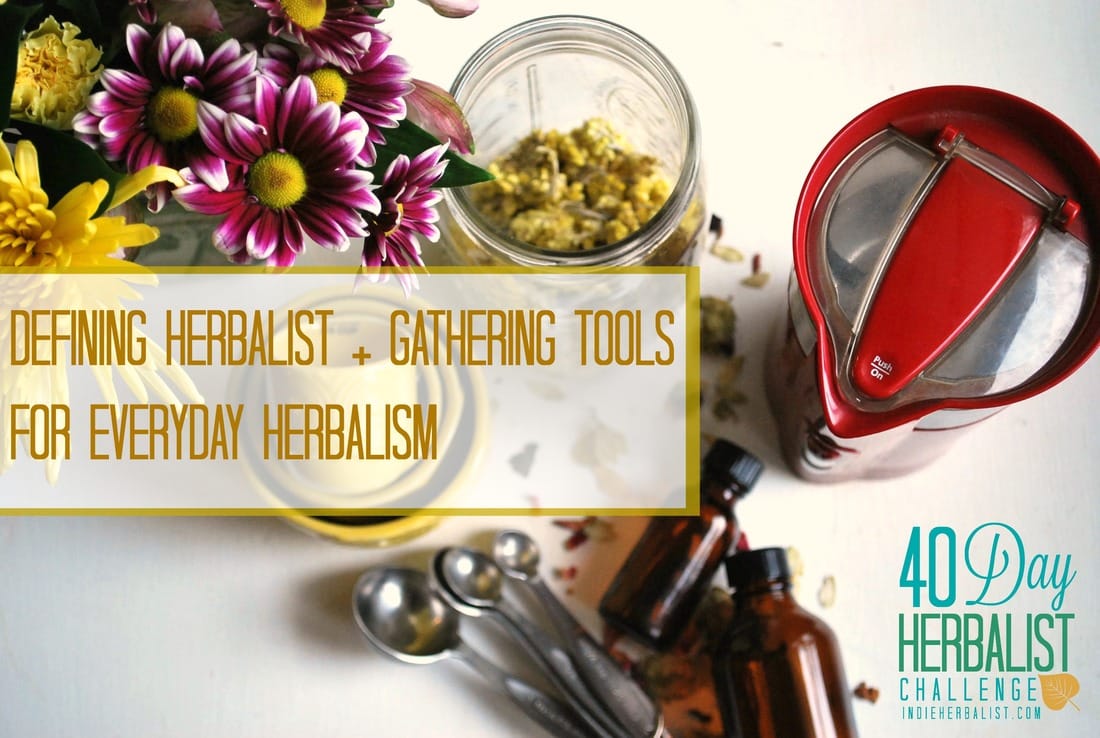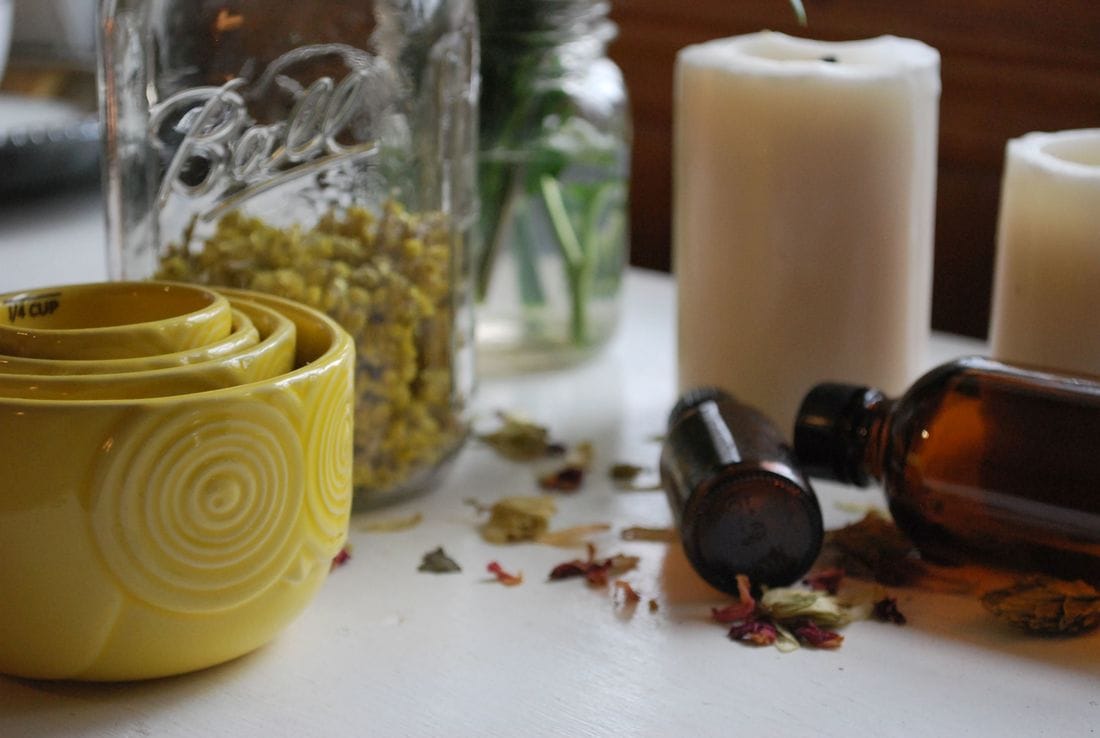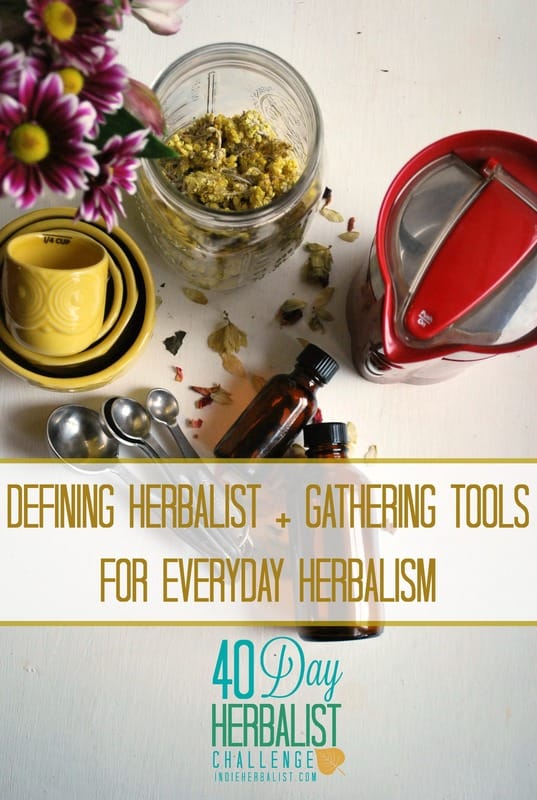Links contained in this post and elsewhere on my website may include affiliate links. When you make a purchase through these links, I earn a commission at no additional cost to you. I only link to products and services that I love - and that I think you will love, too!
But herbalist can be a bit of a catch-all name. Within the herbal community, you will actually find many different types of herbalists (and their attendant traditions of herbalism!). The main point, though, is that, by definition, an herbalist is “one versed in the knowledge of herbs or plants.” So that can be anyone – whether you are interested in herbalism as a hobby, a life skill, or a career. So please, feel welcome here. We are all herbalists!
I find it helpful to think in terms of formal and informal herbalism. On the formal side of things, you might find Traditional Chinese Medicine and Ayurvedic practitioners. These traditions have well developed systems in place for analyzing the people+plant equation. A few other traditions, although less well known than TCM and Ayurveda, also have more or less formalized approaches. Clinical herbalists can also be put in this category.
On the informal side of things, you might find home herbalists, folk herbalists from local or largely oral traditions, eclectic herbalists that utillize concepts from multiple traditions, and those of us with fairly relaxed approaches to doctrine in general (my style of “indie” herbalism definitely fits in here, as do the highly individualized approaches of many others, I’m sure!).
Regardless, herbalists usually find a way to denote what branch of the herbal tribe they belong to by modifying the title “herbalist” in various ways. Some herbalists may affiliate with a particular tradition and make that clear through their choice of title, others may be attempting to denote a specific level of education or professional aspirations.
Speaking of professional aspirations, we will look at ways herbalists can make a living later in the Challenge. For now, let’s look at a few ways to further define herbalist.
Different Types of Herbalists
Home Herbalist
These are herbalists who work with herbs for themselves and their families, possibly close friends as well. It may be a hobby or a passion – but that doesn’t mean they don’t take it seriously!
Community Herbalist
Someone whose focus for herbalism is outside of (or in addition to) herbalism at home. They may see clients, maintain a small business, or be a community resource in some other capacity.
Western Herbalist
Herbalists who like using a framework based on non-eastern (ie formal TCM and Ayurvedic) traditions. Can be home or community herbalists. May have a specific non-Eastern tradition in which they are well versed, or may be somewhat eclectic.
Ayurvedic Herbalist
Herbalists who use Ayurveda, a type of traditional herbalism developed in India, as a framework. Can be home or community herbalists.
Traditional Chinese Medicine (TCM) Herbalist
Herbalists who use Traditional Chinese Herbalism as a framework. May use Eastern herbs exclusively, or apply the TCM framework to include the way they use Western herbs. Can be home or community herbalists.
Clinical Herbalist
People who call themselves clinical herbalists tend to be enamored with the science and technicalities of herbalism. They may have a formal science degree of some kind from a University, or a structured herbal education of some kind. In the United states, it can be synonymous with community herbalist (although it is a more technical sounding title); Some US herbalists are not comfortable with clinical herbalist because it sounds too medical, and it’s important to check legal issues that might arise in your home state if you want to use this title.
Folk Herbalist
Typically less interested in the latest scientific research and more focused on traditional approaches, may prefer simpling (using one plant at a time), but not necessarily. Somewhere opposite to clinical herbalists on the spectrum.
Herbal Educator
These are herbalists, too! Although the Oxford English Dictionary has a pretty neutral definition, other dictionaries may use language that could be problematic in some jurisdictions- like this one from Merriam Webster: a person who grows, sells, or uses herbs to treat illness. (Emphasis mine – Yikes!). So, herbal educator is sometimes adopted as a more conservative option than clinical herbalist or even plain ol’ herbalist.
Certified Herbalist
In the United States, there’s no such thing – at least, in terms of a certifying organization that evaluates and bestows the title based on a universally agreed upon standard. Schools may offer Certificates of Completion, but most schools aren’t accredited, either. This isn’t necessarily a bad thing, but it is something that catches new herbalists unawares.
Master Herbalist
Along the same lines as certified herbalist in that there isn’t really such a thing – anybody could call themselves one, but once you really dive into herbalism you might giggle any time you hear someone use this title. At least, my little irreverent self certainly has a good giggle over it. Herbalism doesn’t strike me as something that can ever be mastered – there’s always something more to learn.
Indie Herbalist
Ok, I totally made this one up- but maybe you will find it useful. This is how I define my path as an herbalist. Lots of DIY spirit, artful creativity, dedicated life-long learning, a dash of irreverence, and a whole lot of heart. A little punk, a lot of spunk. Like an indie musician, but with plants.
Now that we’ve looked at some of the ways people define being an herbalist, let’s take a look at something more practical to the matters at hand. What sort of tools do you need to work with herbs?
Part Two: Basic Tools
So here’s the part where I tell you a really fun secret: being an herbalist doesn’t require much beyond simple tools that you might already have in your kitchen. If you are missing a few things on this list, they shouldn’t be hard to find.
If you are just getting started and don’t have much in the way of kitchen tools, you can probably find everything you need at a grocery store and thrift shop for around $20-$30 if you get really fancy; and for less than that if you just stick to the basics. Discount home supply stores are really fun places to look for bargains, too.
The Very Basic List
Enamel Pot
Use this to boil water and make all kinds of herbal recipes. Enamel is non-reactive, so this is a must.
Wooden spoon or a silicone spatula
Use these for stirring things in your pot without scratching the enamel.
Glass canning jars with lids
These are multifunctional. Use them for steeping teas, making extracts, for holding salves or other goodies, and for storing dried herbs. They come in different sizes from 4oz all the way up to a gallon, but the size I use the most is the wide mouth quart (32 oz) size. A few of the 4 oz are handy for storing small batches of salves and other finished projects. Canning jars also make a decent stand in for a teacup, in a pinch.
You can buy cases of canning jars on the condiments aisle of most grocery stores and in the kitchen wares departments of many big box stores and you can buy small packs of lids (either the metal single use one for canning or reusable plastic ones) on the same aisle. A case of jars is usually around $10 and extra lids and bands might cost around $5 or $6, but you can also often find single jars at thrift shops for a dollar or less. Pick up new lids and you will be good to go!
Large glass measuring cup
You can use this for measuring things, or for pouring things into smaller containers. They can also double as a mixing bowl in a pinch.
Set of measuring spoons
It’s nice to be able to accurately measure herbs for making tea, and you will find that these are useful when you have an herbal recipe to try.
Mesh strainer
These are a great, reusable way to strain teas, and they also do a great job holding coffee filters for fine straining (like for filtering powdered herbs out of an extract.
Unbleached coffee filters
Use these for straining teas, extracts, etc. that use powdered herbs.
Old cloth napkins/kitchen towels
These are great for cleaning up spills and messes. Paper towels work, too, but cloth napkins from the thrift shop are cheap + reusable!
Branching Out Gear
You may already have these in your kitchen, too, but if not that’s ok. They make things a little easier and more precise, but they aren’t 100% necessary when you are just getting started.
- Tea kettle
- Smaller sized measuring cups
- Funnel
- Colander
- Teacups/Coffee mugs
- Tea cup strainers/ Tea balls
- Nesting set of mixing bowls
- 4 oz Amber round bottles
- Reusable plastic lids for canning jars
Getting Fancy
When you are 100% sure you are into this whole herbalism thing, you might enjoy some of the items on this list.
- Kitchen scale (a digital one that reads grams and ounces is helpful)
- Coffee grinder (for powdering dried herbs and spices in-house)
- Fancy bottles, jars, and tins
- Dehydrator or drying screens for drying homegrown herbs
- Dedicated knives and cutting boards
- Jelly bag (makes straining even easier than coffee filters and strainers)
Your Mission
Take stock of your kitchen tools and make sure you have everything on the basic list. These are tools we will be using later in the challenge, so it will be good to round them up this week. Here’s the list again:
- 1 enamel pot with lid
- Wooden spoon(s) or a small silicone spatula:
- 1, 32 oz glass canning jar (at least)
- 2 or 3 other glass canning jars in different sizes
- Mesh strainer
- Unbleached coffee filters
Next, here’s the fun part where we chat in the comments!
For those of you who have been learning herbalism for a while, do you have a favorite tool that’s not on my lists? I’d love to hear about it, and I’m sure others who are taking the Challenge would, too!
Next, take a few minutes to think about how you define yourself as an herbalist. Do you have a unique definition of your own, like the “indie herbalist” definition that I shared earlier?
If you’d like, share your thoughts on those two questions in the comments below. Thanks for joining us for today’s Challenge, and I will see everyone tomorrow for Day 3: A Phrasebook for Learning Herb-Speak.
All the best,
Agatha
More Fun!
|
Agatha is the author of the popular new herbal recipe book, Adaptogens: Your Guide to Radiant Health.
|



